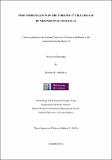| dc.contributor.advisor | Griffin, Matthew D. | |
| dc.contributor.author | Duffy, Michelle M. | |
| dc.date.accessioned | 2013-08-01T11:43:37Z | |
| dc.date.available | 2014-02-03T12:07:44Z | |
| dc.date.issued | 2012-11-20 | |
| dc.identifier.uri | http://hdl.handle.net/10379/3592 | |
| dc.description.abstract | T-helper 17 (Th17) cells play a pathogenic role in multiple sclerosis, inflammatory
bowel disease, psoriasis, acute kidney injury, glomerulonephritis and transplant
rejection. Mesenchymal stem cells (MSCs) are immunosuppressive with potential to
treat inflammatory and autoimmune disease. Natural and synthetic vitamin D receptor
(VDR) agonists also have direct and indirect suppressive effects on T-helper
differentiation pathways including Th17. The aim of this thesis was to investigate the
effects of MSCs and the VDR agonist paricalcitol alone and in combination on Th17-
mediated responses in vitro and in a mouse model of obstructive nephropathy,
characterized by maladaptive Th17 responses - unilateral ureteral obstruction (UUO).
MSCs potently suppressed naïve-phenotype responders undergoing primary Th17
differentiation but were less inhibitory towards memory-phenotype responders and
had the potential to enhance IL-17A production by fully differentiated Th17 cells in
the presence of IL-1 and IL-23. MSC-induced primary Th17 inhibition was mediated
via induction of cyclooxygenase (COX)2 and subsequent prostaglandin E2
(PGE2)/EP4 signaling. This was associated with reduced expression of multiple key
intracellular transcription factors including ROR gamma t, IRF4 and Runx1. Paricalcitolmediated
suppression of Th17 differentiation occurred independently of antigen
presenting cells and was associated with upregulation of the VDR.
In UUO, MSCs and paricalcitol, alone and in combination suppressed Th17 responses
in terms of IL-17A expression and neutrophil recruitment. This was associated with
evidence of an alteration in the balance between pro- and anti-inflammatory
macrophages in addition to reduced interstitial fibrosis and tubular atrophy.
My results indicate the potential for MSCs to ameliorate tissue damage associated
with maladaptive acute or chronic Th17 activation and suggest that adjunctive therapy
with VDR agonists may represent a strategy for enhancing the immunosuppressive
properties of MSCs. | en_US |
| dc.rights | Attribution-NonCommercial-NoDerivs 3.0 Ireland | |
| dc.rights.uri | https://creativecommons.org/licenses/by-nc-nd/3.0/ie/ | |
| dc.subject | Mesenchymal stem cells | en_US |
| dc.subject | Vitamin D | en_US |
| dc.subject | Immunology | en_US |
| dc.subject | T lymphocytes | en_US |
| dc.subject | Immune suppression | en_US |
| dc.subject | Renal injury | en_US |
| dc.subject | Immunology and Transport Biology Group | en_US |
| dc.subject | National Centre for Biomedical Engineering Science (NCBES) | en_US |
| dc.title | Immunomodulation of the T-helper 17 Cell Lineage by Mesenchymal Stem Cells | en_US |
| dc.type | Thesis | en_US |
| dc.contributor.funder | Science Foundation Ireland | en_US |
| dc.contributor.funder | Abbott Laboratories | en_US |
| dc.local.note | T-helper 17 (Th17) cells are a subset of T lymphocytes which are pathogenic in autoimmune and inflammatory disease. Mesenchymal stem cells (MSCs) are adult stem cells with the potential to suppress immune responses and treat such diseases. Synthetic formulations of vitamin D receptor (VDR) agonists also have similar potential. My results indicate the potential for MSCs to reduce tissue damage associated with Th17 cell activation and suggest that combined therapy with VDR agonists may represent a strategy for enhancing the suppressive properties of MSCs. | en_US |
| dc.local.final | Yes | en_US |
| nui.item.downloads | 285 | |


